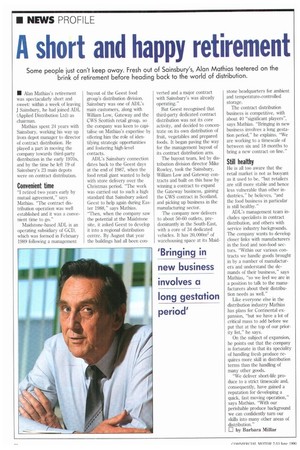A short and happy retirement
Page 26

If you've noticed an error in this article please click here to report it so we can fix it.
Some people just can't keep away. Fresh out of Sainsbury's, Alan Mathias teetered on the brink of retirement before heading back to the world of distribution.
NI Alan Mathias's retirement was spectacularly short and sweet: within a week of leaving J Sainsbury. he had joined ADL (Applied Distribution Ltd) as chairman.
Mathias spent 24 years with Sainsbury, working his way up from depot manager to director of contract distribution. He played a part in moving the company towards third-party distribution in the early 1970s, and by the time he left 19 of Sainsbury's 23 main depots were on contract distribution.
Convenient time
"I retired two years early by mutual agreement," says Mathias. "The contract distribution operation was well established and it was a convenient time to go."
Maidstone-based ADL is an operating subsidiary of GCD, which was formed in February 1989 following a management buyout of the Geest food group's distribution division. Sainsbury was one of ADL's main customers, along with William Low, Gateway and the CWS Scottish retail group, so the company was keen to capitalise on Mathias's expertise by offering him the role of identifying strategic opportunities and fostering high-level contacts.
ADL's Sainsbury connection dates back to the Geest days at the end of 1987, when the food retail giant wanted to help with store delivery over the Christmas period. "The work was carried out to such a high standard that Sainsbury asked Geest to help again during Easter 1988," says Mathias. -Then, when the company saw the potential at the Maidstone site, it asked Geest to develop it into a regional distribution centre. By August that year the buildings had all been con
verted and a major contract with Sainsbury's was already operating."
But Geest recognised that third-party dedicated contract distribution was not its core activity, and decided to concentrate on its own distribution of fruit, vegetables and prepared foods. It began paving the way for the management buyout of its contract distribution arm.
The buyout team, led by distribution division director Mike Rowley, took the Sainsbury, William Low and Gateway contracts and built on this base by winning a contract to expand the Gateway business, gaining the CWS contract in Scotland, and picking up business in the manufacturing sector.
The company now delivers to about 50-60 outlets, predominantly in the South-East, with a core of 34 dedicated vehicles. It has 20,000m2 of warehousing space at its Maid
stone headquarters for ambient and temperature-controlled storage.
The contract distribution business is competitive, with about 40 "significant players", says Mathias. "Bringing in new business involves a long gestation period," he explains. "We are working to a timescale of between six and 18 months to bring a new contract on line."
Still healthy
He is all too aware that the retail market is not as buoyant as it used to be, "but retailers are still more stable and hence less vulnerable than other industries," he believes, "and the food business in particular is still healthy."
ADL's management team includes specialists in contract distribution, and others with service industry backgrounds. The company wants to develop closer links with manufacturers in the food and non-food sectors. "Within our various contracts we handle goods brought in by a number of manufacturers and understand the demands of their business," says Mathias, "so we feel we are in a position to talk to the manufacturers about their distribution needs as well."
Like everyone else in the distribution industry Mathias has plans for Continental expansion, "but we have a lot of critical mass to add before we put that at the top of our priority list," he says.
On the subject of expansion, he points out that the company is fortunate in that its speciality of handling fresh produce requires more skill in distribution terms than the handling of many other goods.
"We deliver short-life produce to a strict timescale and, consequently, have gained a reputation for developing a quick, fast moving operation," says Mathias. "With our perishable produce background we can confidently turn our skills into many other areas of distribution."
III by Barbara Millar




































































































































